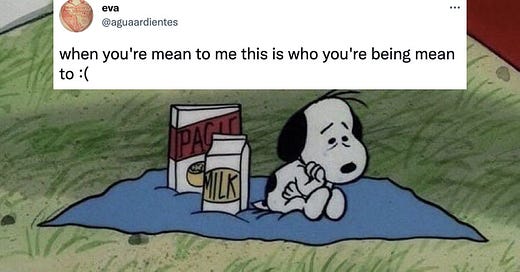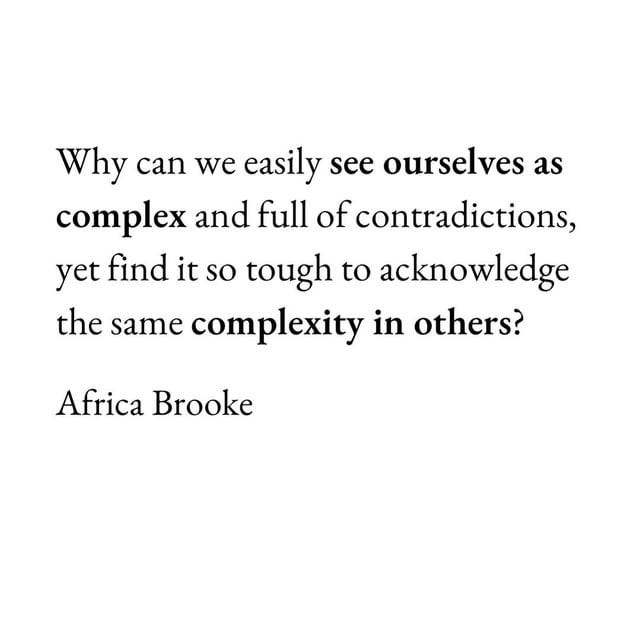So this week I had a kind of weird exchange online with a successful NYT bestselling author who was annoyed that I shared her tweet without (checks notes) linking to her book…? It made me feel especially strange since this is a writer whose work I have written about, linked to, and praised in the past (like fwiw I have indeed linked to your book, ma’am). The whole thing made me feel so weird, and I started to interrogate why it was making me feel that way. I’ve gotten really hateful and unhinged comments on my posts in the past, and they don’t really phase me at all, but for some reason this annoying but otherwise benign comment really hooked it’s claws into me.
In my day-to-day work, I am faced with a lot of contradictions all the time. I do policy related work on the issue of sexual abuse in detention, and that involves holding A LOT of space for multiple things to be true at once. On any given day I might be in meetings with prison wardens, rape crisis advocates, policy makers, media, and/or incarcerated survivors. All of these different groups of people come with vastly different perspectives, experiences, ideas, politics, and agendas, but what we do have in common is the belief that everyone deserves to live a life safe and free from violence. We might disagree on how to achieve this and the stakes might be higher for some than others, but I always approach my work with a baseline of giving everyone I work with the benefit of the doubt that we are after the same goal. I choose to believe in the humanity of who I’m working with no matter what crime they’ve committed, who they voted for, what they post on social media, or what words they use to talk about this issue.
I was not always like this. In the past I have been extremely judgemental of people I don’t agree with. I have talked down to them, spoken about them with othering language, and emphasized my lack of care for people whose beliefs I find abhorrent. This is not to say we shouldn’t hold people accountable, cut ties or set boundaries when necessary, or that I think “cancel culture has gone to far” (it hasn’t). But we are so quick to assume that because someone believes something different than us, posts or does not post in the same way we do, if they don’t talk about things like we do, if they don’t vote in the same way we do, or care in the same way we do — that they are somehow worse people than we are. And that is such a slippery slope.
I feel strongly that people can be wrong — very very wrong — and not be bad. And, crucially, they still have complexity and worth and the capacity to evolve, grow, and change. But even if they never change — they are still just as deserving of safety and dignity as anyone else. If I didn’t believe this, I couldn’t do the work that I do. My approach to my work and to greater human rights at large is rooted in my core ethics of liberation, equity, and abolition, and I strive to engage and be involved in things that creating meaningful lasting change. I like to think of myself as “good” and “right”, and yet I also allow myself to be a nuanced person who is learning and evolving everyday. If I get to do that, then other people should be allowed that same level of nuance.
We can encourage each other, challenge each other, and hold each other accountable without dehumanizing each other. Without being condescending. Without being cruel.
This comment from this writer was not as serious as all of this, but I think the feeling it triggered in me was that of not being given the benefit of the doubt. It just reminded me of how often I see folks who are fighting for the same thing turn on one another because of really small differences. This is how movements fail. We cannot bully our way to freedom — liberation includes everyone, even those we don’t see eye-to-eye with (and I mean this in big and small ways). So I guess my wish is that we’d give each other the benefit of the doubt and the space to be nuanced, complex people who are figuring it out. Let’s allow each other to have different approaches, ideas, perspectives. And let’s not leave weird passive aggressive comments on each other’s Instagram posts. The world is tough enough as it is.
I’ve been to busy to read much this week, but I just finished the book Small Pleasures by Clare Chambers and I loved it. Also, speaking of my job, here are some great resources if you want to start learning how to talk about incarceration.
How to effectively argue against jail construction.
Prisons are facing a massive staffing crisis and it’s putting incarcerated people in danger. Learn more about this crisis and its impacts.
Summer is coming. Learn about the impact climate change has on incarcerated people.






